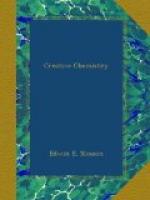Chemistry creates its object. This creative faculty, comparable to that of art itself, distinguishes it essentially from the natural and historical sciences.... These sciences do not control their object. Thus they are too often condemned to an eternal impotence in the search for truth of which they must content themselves with possessing some few and often uncertain fragments. On the contrary, the experimental sciences have the power to realize their conjectures.... What they dream of that they can manifest in actuality....
Chemistry possesses this creative faculty to a more eminent degree than the other sciences because it penetrates more profoundly and attains even to the natural elements of existences.
Since Berthelot’s time, that is, within the last fifty years, chemistry has won its chief triumphs in the field of synthesis. Organic chemistry, that is, the chemistry of the carbon compounds, so called because it was formerly assumed, as Gerhardt says, that they could only be formed by “vital force” of organized plants and animals, has taken a development far overshadowing inorganic chemistry, or the chemistry of mineral substances. Chemists have prepared or know how to prepare hundreds of thousands of such “organic compounds,” few of which occur in the natural world.
But this conception of chemistry is yet far from having been accepted by the world at large. This was brought forcibly to my attention during the publication of these chapters in “The Independent” by various letters, raising such objections as the following:
When you say in your article on “What Comes from Coal Tar” that “Art can go ahead of nature in the dyestuff business” you have doubtless for the moment allowed your enthusiasm to sweep you away from the moorings of reason. Shakespeare, anticipating you and your “Creative Chemistry,” has shown the utter untenableness of your position:
Nature is made better by no mean,
But nature makes that mean: so o’er that art,
Which, you say, adds to nature, is an art
That nature makes.
How can you say that art surpasses
nature when you know very
well that nothing man is able to make can in
any way equal the
perfection of all nature’s products?
It is blasphemous of you to claim
that man can improve the
works of God as they appear in nature. Only
the Creator can
create. Man only imitates, destroys or defiles
God’s handiwork.
No, it was not in momentary absence of mind that I claimed that man could improve upon nature in the making of dyes. I not only said it, but I proved it. I not only proved it, but I can back it up. I will give a million dollars to anybody finding in nature dyestuffs as numerous, varied, brilliant, pure and cheap as those that are manufactured in the laboratory. I haven’t that amount of money with me at the moment, but the dyers would be glad to put it up for the discovery of a satisfactory natural source for their tinctorial materials. This is not an opinion of mine but a matter of fact, not to be decided by Shakespeare, who was not acquainted with the aniline products.




